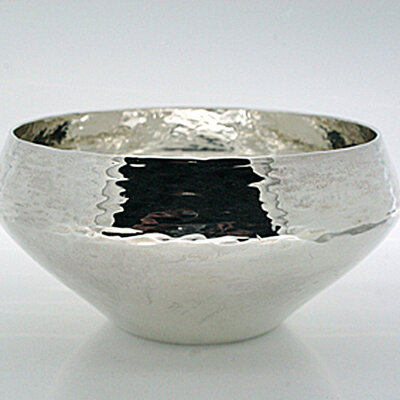On this course, you will have the opportunity to develop new skills and further develop previously gained skills. Tuition is given on a one-to-one basis and the techniques covered are: raising and planishing, seamed and raised (symmetrical and asymmetrical), scoring, fabrication, use of the Bonny Doon press; making a joint (hinge), book, flush, sprung and appropriate catches; assembly by soldering rivets or screw threads.
You may wish to experiment with different types of finish and decoration. Although the College has a good range of tools, it may be necessary to make specific tools where your design necessitates.
Prior to the course, the tutor is available to discuss your design or what you wish to attain from the course, and he will advise on the sizes of material needed. This will save valuable time when the course begins as specialist tools can be sourced where necessary. As you have previous experience, it is most probable that you will have some tools of your own and you are encouraged to bring them. Please mark your tools with two colours as very often students have the same colour. West Dean tools are marked with orange.
Working in a workshop environment, you are advised to wear protective clothing and certain processes will need eye protection.
Arrival Day - this is the first date listed above
Courses start early evening. Residential students to arrive from 4pm, non-residential students to arrive by 6.45pm.
6.45pm: Welcome, followed by dinner (included).
8 - 9pm: First teaching session, attendance is essential.
Daily timetable
Classes 9.15 - 5pm, lunch is included.
From 6.30pm: Dinner (included for residential students).
Evening working - students may have access to workshops until 9pm, but only with their tutor's permission and provided any health and safety guidelines are observed.
Last day
Classes 9.15am - 3pm, lunch is included.
Residential students are to vacate their rooms by 10am please.
(This timetable is for courses of more than one day in length. The tutor may make slight variations)
What students need to bring
- Apron
- Protective clothing, including strong shoes and something to tie your hair back with, if it is long
- Personal tool kit – if you have one (please mark all tools – the College equipment has orange marks)
- Your ideas/sketches/work in progress – as discussed with the tutor
- Please email any details of any relevant previous experience and what you would like to achieve on the course to: [email protected] before the course. This will help the tutor plan the best course possible.
Available to buy
- Available from shop:
- Silver can be purchased from the College Shop, which stocks a range of sheet, wire, rod, tube and findings. These will be available in set sizes and lengths, suitable for a wide range of projects. If you require more than 156.25 sq cms (25 sq ins), you should obtain it from a bullion supplier (see below).
Additional information
Please note: Recommended bullion suppliers: Argex Ltd, Metalor Ltd, Exchange Findings Ltd, Bloomsteins. Cookson Precious Metals Ltd, Metalor Ltd
Please wear appropriate clothing/aprons for the workshop or studio, this includes stout covered footwear i.e. no open-toed shoes or sandals.




